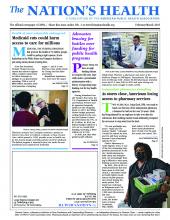
Physician assistant Sue Covington examines a patient at Doctors Care clinic in Littleton, Colorado, in May. Doctors Care, which opened in 1998, provides access to health care for low-income people and helps patients enroll in Medicaid. The federal program is expected to face cuts under the new presidential and congressional leadership.
Photo by Hyoung Chang, courtesy The Denver Post/Getty Images
“These are not just numbers. These are real people who depend on Medicaid programs for their health care, for their cancer treatment, for coverage of their children.”
— Adam Searing
Medicaid, the federal program that protects the health of 72 million people, could be getting a tight squeeze, if new leadership in the White House and Congress decides to put saving money ahead of saving lives.
Now that President Donald Trump has reassumed the nation’s highest office, insiders expect him to follow through on pledges to cut government spending. With a cost of $860 billion annually, Medicaid presents a tempting target — and it is one that has come under attack by Trump and his allies previously.
Republican legislators, who now have the majority in both chambers of Congress, have tried to slash the federal Medicaid budget before, including efforts under Trump’s first presidency. For Trump’s second term, conservative organizations and legislators have proposed sweeping changes to Medicaid that could devastate the program.
At risk is the health of millions of people with low incomes, pregnant women and people with disabilities who are enrolled in Medicaid. The program covers more than 40% of all U.S. births, 63% of all nursing home residents and more than a third of all Black, Hispanic and American Indian and Alaska Native U.S. adults.
“These are not just numbers,” Adam Searing, JD, MPH, an associate professor at the Georgetown University McCourt School of Public Policy’s Center for Children and Families, told The Nation’s Health. “These are real people who depend on Medicaid programs for their health care, for their cancer treatment, for coverage of their children.”
One of the provisions that could come under attack is expanded eligibility for Medicaid. Under the Affordable Care Act, states can expand Medicaid coverage to people with incomes up to 138% of the poverty level, about $20,700 per person in 2024. For the 40 states and the District of Columbia that have expanded Medicaid eligibility, the federal government pays an enhanced federal matching rate. For people in the expanded group, up to 90% of health care expenses are paid for by federal funds.
Federal officials will likely reduce Medicaid funding through block grants and per capita caps — both of which set a limit on funding dollars, said Edwin Park, JD, research professor at the Georgetown University McCourt School of Public Policy’s Center for Children and Families.
Most states will need to find billions to keep current Medicaid-funded public health programs alive. For example, a KFF analysis found that if federal funding for California’s Medicaid expansion was cut from 90% to 50% — the state’s federal matching allocation for traditional Medicaid — California would need to budget $14 billion more each year to keep pace with Medicaid expansion costs.

Miriam Kadhim, center, an eligibility specialist with Neighborhood Health, speaks with a resident outside the Springfield-Franconia Family Resources Center in Virginia about her eligibility for Medicaid in 2023. Republicans in Congress are considering cuts to the program, which allows people with low incomes to access health care services. About 72 million Americans were enrolled in Medicaid last year, including pregnant women and people with disabilities.
Photo by Jahi Chikwendiu, courtesy The Washington Post/Getty Images
“This cap amount is inadequate,” Park told The Nation’s Health. “The cap amount is not going to adjust for any unanticipated additional costs, whether because of a natural disaster, a recession, a pandemic, a new drug therapy coming to the market. States are on the hook for all that. States are going to have to dramatically shrink their programs.”
Work requirements, increased premiums or coverage lockouts for administrative reasons may also be on the table. The new administration could also revisit its past policies, such as limits on how much money is spent on each Medicaid recipient.
To balance their budget, states may decide to cover fewer services for Medicaid beneficiaries or cut reimbursements to physicians, hospitals and nursing homes. Another possibility is that lawmakers will trim the qualifying amount for Medicaid expansion from 138% of the poverty level to perhaps 100% or lower, analysts say, eliminating millions of people from the program.
“And, you know, that’s the goal of this type of proposal: to avoid the political fallout from explicitly repealing the expansion, but effectively repealing it by causing states to drop it over time,” Park said.
For nine states with trigger laws, the impact on health care from federal funding caps would come sooner rather than later. Arkansas, Illinois, Indiana, Montana, New Hampshire, North Carolina, Utah, and Virginia have laws that end ACA’s Medicaid expansion automatically if federal funding drops below 90%, In Arizona, it is 80%.
In those nine states, over 3.7 million low-income people could suddenly find themselves with no health care insurance, Park said.
The cuts would run contrary to public opinion, as support of Medicaid has increased, exemplified by the number states that have adopted expansion in recent years. A KFF 2024 report found that 70% of Americans want Medicaid to remain as it is.
Advocates can help fight for the program by spreading the word that reduction of federal matching funds means loss of health care for tens of millions, Searing said.
“Helping people understand that, as a public health professional, is something that is really important,” he said. “There’s no way that states are going to be able to make up that kind of a budget cut.”
For more information on what is at stake under cuts to Medicaid, visit www.kff.org.
- Copyright The Nation’s Health, American Public Health Association









